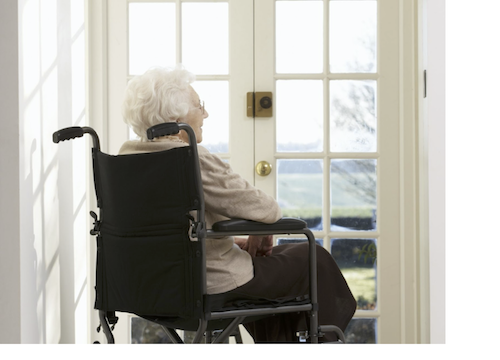Understanding the world of assisted living and nursing homes can be like learning a new language. Add a bit of dementia and a worldwide pandemic to the mix and the recipe becomes messy. Advocating for your senior under these circumstances requires creativity and perseverance!
5 strategies to advocate for your senior in an assisted living facility or nursing home
1. Make use of “compassionate care visits”, available under certain circumstances. These may include end-of-life situations, but those are not the only circumstances that qualify. According to the Department of Health & Human Services Centers for Medicare & Medicaid Services, compassionate care situations include, but are not limited to:
• A resident, who was living with their family before recently being admitted to a nursing home, is struggling with the change in environment and lack of physical family support.
• A resident who is grieving after a friend or family member recently passed away.
• A resident who needs cueing and encouragement with eating or drinking, previously provided by family and/or caregiver(s), is experiencing weight loss or dehydration.
• A resident, who used to talk and interact with others, is experiencing emotional distress, seldom speaking, or crying more frequently (when the resident had rarely cried in the past).
Allowing a visit in these situations would be consistent with the intent of “compassionate care situations.” Also, in addition to family members, compassionate care visits can be conducted by any individual that can meet the resident’s needs, such as clergy or lay persons offering religious and spiritual support.
2. Don’t hesitate to speak up as your senior’s advocate. This is not the time to worry about being “liked”. Just remember to be courteous. Dozens of times I specifically spoke up about an IV. I usually say something like, “I appreciate you, but he’s an impossible stick so we need the specialist.” I imagine how I’m going to feel if I don’t stand up and ask for what my senior needs.
 In general, try to understand the situation before you begin expressing your concerns. Let’s say you are concerned that your senior isn’t getting their physical therapy. Bring it up with the most appropriate person by commenting in a neutral way: “My dad said something about not having PT. I’m curious to understand his current PT schedule and how that’s going.” You’ll likely get a much better response than, “Why is my dad not getting his PT?!”
In general, try to understand the situation before you begin expressing your concerns. Let’s say you are concerned that your senior isn’t getting their physical therapy. Bring it up with the most appropriate person by commenting in a neutral way: “My dad said something about not having PT. I’m curious to understand his current PT schedule and how that’s going.” You’ll likely get a much better response than, “Why is my dad not getting his PT?!”
3. Establish one point of contact at your senior’s residence. Discover the best time of day for them to talk with you regarding their updates and observations. Specifically ask, “Do you see any changes that concern you?” If you can regularly talk to the same person, consider setting up a 1-5 scale regarding how your senior is doing overall. This way you can more objectively compare day to day. Keep good notes about these conversations with dates and the names with whom you’ve spoken.
4. Set up a time to talk to your parent using video technology. It’s very hard to advocate for your senior if you cannot see them. When you see them (even if it’s just over video call) you can pay attention to things like: is their hair combed, have they lost weight or simply do they look like themselves or not. Nursing home or assisted living staff should be able to assist you with setting up these calls. Some places have a tablet for video calls that can be sanitized and shared between residents.
5. Should you have concerns about the care your senior is receiving, first ask to talk to the director of the nursing home. Keep good notes about what exactly was discussed. If you feel that the issues or concerns are not being addressed despite your continued attempts, contact the Long-Term Care Ombudsman Program in your state to assist you.
What is a Long-Term Care Ombudsman?
An ombudsman (pronounced aam·buhdz·muhn) is a trained volunteer who acts as an advocate for residents of nursing homes, adult family homes, and assisted living facilities. Their purpose is to protect and promote the Resident Rights guaranteed these residents under Federal and State law and regulations. They are trained to receive complaints and resolve problems in situations involving quality of care, use of restraints, transfer and discharge, abuse and other aspects of resident dignity and rights.
May you find joy in loving one another well, even if it has to be from afar!
Elizabeth Dameron-Drew is the Co-Founder & President of Ways & Wane. She walked closely with her own father through his years of waning. She lives near Seattle, Washington with her two teenage sons, husband and two rescue dogs. When she’s not working on this platform she’s probably creating books, sewing, or vacuuming, or cooking while listening to the rain and thinking about her next creative endeavor.
